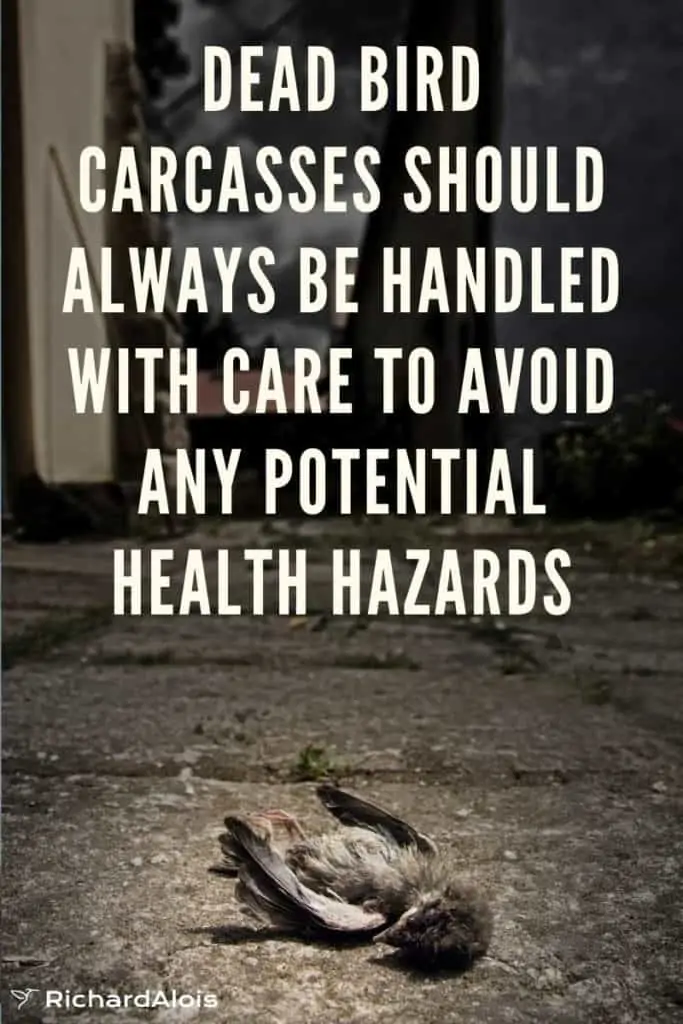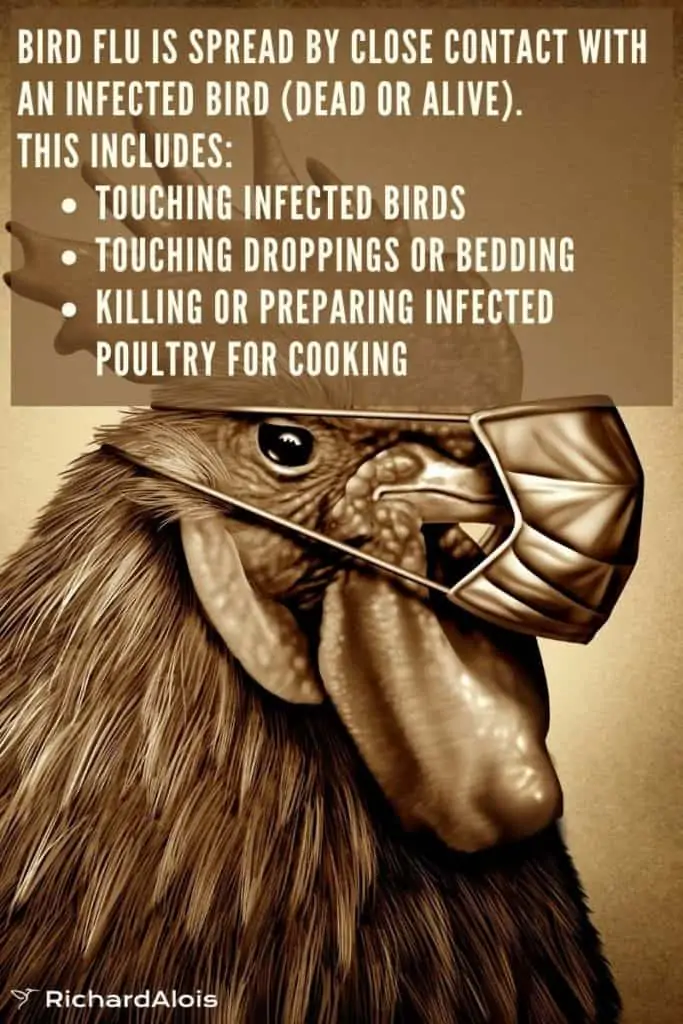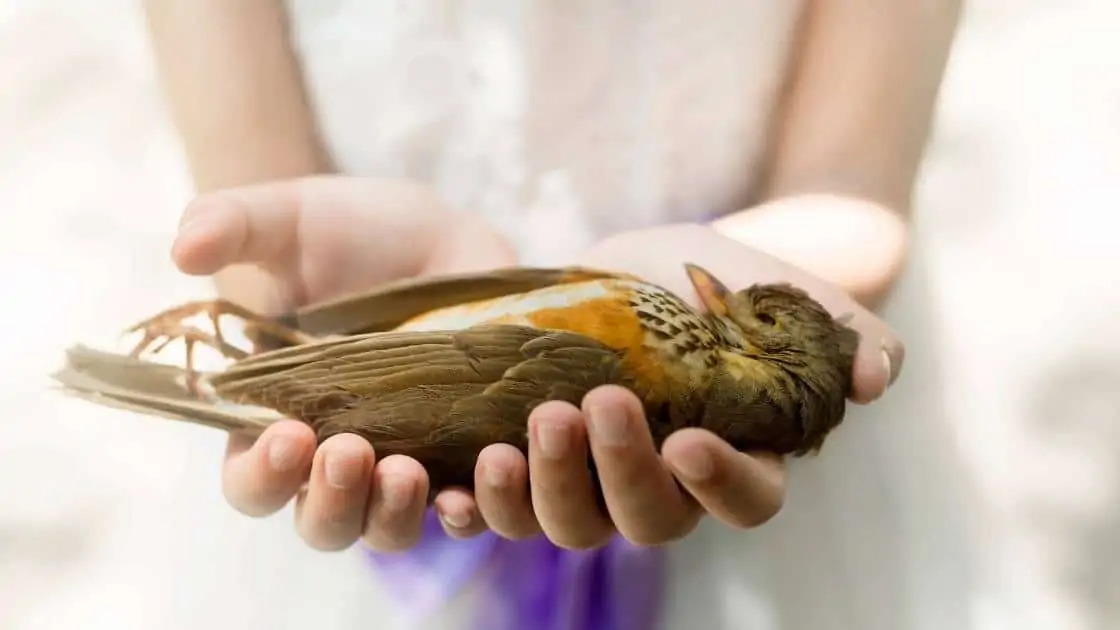Dead birds are a common sight in many parts of the world, and their dead bodies can be found on sidewalks, near buildings, and inside homes. Dead bird carcasses should always be handled with care to avoid any potential health hazards that may arise from dead animal exposure, including diseases like rabies or Salmonella poisoning. In this article, we will discuss 12 steps on how you can handle dead birds safely.
Table of Contents

1) Are dead birds dangerous?
Dead birds are more likely to be dangerous dead than alive. They can carry bacteria and viruses that could make you sick, so don’t touch or taste anything from a dead bird.
Keep children away from animal carcasses in general, even those of dead birds, because they will often want to play with them–even though these animals are still dead and might cause health problems for the child.
2) Are dead birds dangerous for dogs?
Dead Birds can be dangerous for dogs if they have bacteria or viruses on them that could make your pet sick; dead bird carcasses should not be touched unless they are bigger than a cat because there may also be parasites present. It is safer to call either an animal control service or the police before handling dead birds. Dead animals like dead squirrels and rabbits should be put in double plastic bags to avoid infection, but people might think you’re crazy for cutting off their heads first – but this is done because it’s most likely that they will have bacteria on them near their head.
3) Are dead birds compostable?
Yes, dead birds are compostable. You can put them in your yard waste bin or bury them under the soil and let nature take its course; dead animals might also be possible to use as a fertilizer for plants–but you should always contact an expert before doing anything with dead animals carcasses.
Dead Birds are compostable because they will break down into organic material that is safe for plant consumption once buried or thrown out. If you want to dispose of dead bird remains without burying them, putting them in your yard waste bin would be the next best option available and could make healthy plants grow faster. Dead animals may also work well as fertilizers if handled correctly but contacting an expert beforehand is recommended when dealing with dead animal carcasses.
4) Are dead birds poisonous?
Dead birds are not poisonous but they can be hazardous to touch because of potential health risks. If you find dead animals on your property, wear gloves when handling them and do not let children play with the carcasses–dead animal remains might also work as fertilizers if handled correctly so make sure to contact an expert before doing anything else!
5) Can I touch a dead bird?
No, dead birds should not be touched and dead animals should never be touched unless they are bigger than a cat–don’t touch anything found within wildlife dead bodies because there might be hazards.
Dead Birds may look like harmless animals but one thing to remember is that dead animals can harbor human illness-causing bacteria such as salmonella or tetanus. When disposing of dead bird carcasses, Dr. Gulsvik recommends wearing gloves when handling them and not letting children play with the remains of any animal because it’s possible for dead animal carcasses to work as fertilizers if handled correctly so make sure you contact an expert before touching this type of waste product!

6) Can dead birds transmit bird flu?
Bird flu, also known as avian influenza A H5N1 or AI bird flu virus is a virulent form of the disease that infects humans and birds. There have been many cases reported in recent years with outbreaks occurring all over Asia due to close contact between infected wild waterfowl (dead or alive) and people who live nearby. These include: touching infected birds; touching droppings or bedding from an infected bird’s cage – often this will be used for chicken coops too; killing or preparing sick poultry for cooking before it dies naturally which includes markets, where live chickens are sold, can also pose some risk if you visit them while traveling abroad to countries affected by the outbreak so avoid these at any costs.
7) Can a dead bird have rabies?
Dead Birds don’t transmit any type of virus-like rabies known as rabid cat bite fever or bat syndrome. Rabies is a vicious disease that’s not present in birds, so your dog can’t get rabies from a dead bird. That’s because only mammals can contract it and humans are the most common carriers of this deadly illness.
Dead animals can harbor a risk for transmission which is why it’s best not to touch anything found within wildlife dead bodies because there might be hazards and they should only be handled with gloves on during cleanup–don’t let your children play around dead animals either!
8) How to preserve a dead bird’s body?
It is not recommended that dead bird bodies should be preserved. It’s best to contact an expert who can provide the necessary steps and precautions for dead animal carcasses–dead animals are probably best left untouched by humans unless they’re bigger than a cat because it could lead to potential hazards!
9) What do dead birds smell like?
There isn’t any specific way that dead bird feathers come in different smells–most of the time these types of birds will only emit the scent when decomposing. Most dead birds don’t have a specific odor but they could be rank with decomposing bacteria such as salmonella or tetanus.
10) How long do dead birds last before decaying?
A dead bird will last about a week before they start to decay. This is mainly because of their internal organs, which need oxygen and warm blood mostly for them to function properly. If the dead bird was kept in an environment with no air and cold temperatures then it could be preserved for much longer than a regular dead animal or human being would- but this can also change depending on how securely that dead creature (or anything else) was stored away from any type of outside contact. And even if there are other factors involved with preservation, one thing remains true: once a dead bird starts to decompose it’s still never safe enough again until all the bacteria have been removed by killing them off through boiling everything down into soup form or by using some other type of chemical disinfectant.
11) How do I bury a dead bird?
You can bury dead birds by making a hole in the ground and placing them inside of it. When it comes to burying dead animals, one thing you’ll want to do is thoroughly clean their fur or feathers beforehand so there are no traces left behind on your hands that might harm someone else- even if they don’t touch dead creatures themselves but come into contact with the dead animal’s dirtied up fur from walking past where you buried said creature without washing your own first. It may not be pleasant work, but at least this way nobody has to walk around smelling bad for days afterward due to being infected with harmful bacteria coming off an unclean dead animal (or bird). Check also our post about a dead bird in a pool and how to handle it.
12) Should I report dead birds?
If you find dead birds in your home then it’s important to report them if there are any children or pregnant women living at that address. If not, the next best thing would be to dispose of the dead bird by burying it- but before doing so make sure its fur is clean and free from any harmful bacteria first else it may contaminate other items around your house (like carpets) which can result in sickness later on for anyone who comes into contact with those contaminated surfaces wetted down with water droplets from said dead animal(or anything else)’s dirty hair/fur.
Conclusion
It is important to know how best to handle dead birds. Dead bird disposal can be a tough job for those who do not understand the proper protocol and the health risks that are involved. If you have any questions about the handling of a deceased animal, please contact your local public works department or waste management facility. They will advise on what needs to happen next with the carcass, as well as ways in which it should be disposed of respectfully so that others may avoid coming into contact with it themselves. Read here, in case you want to know a dead bird’s meaning.



